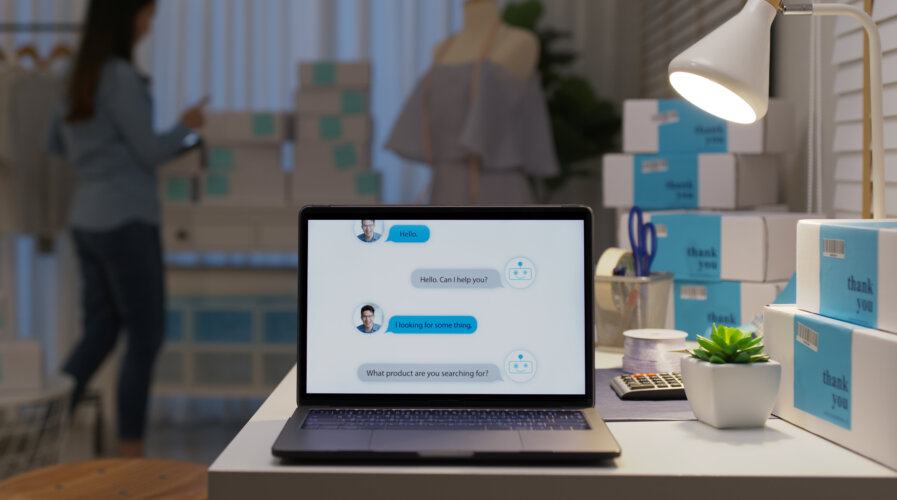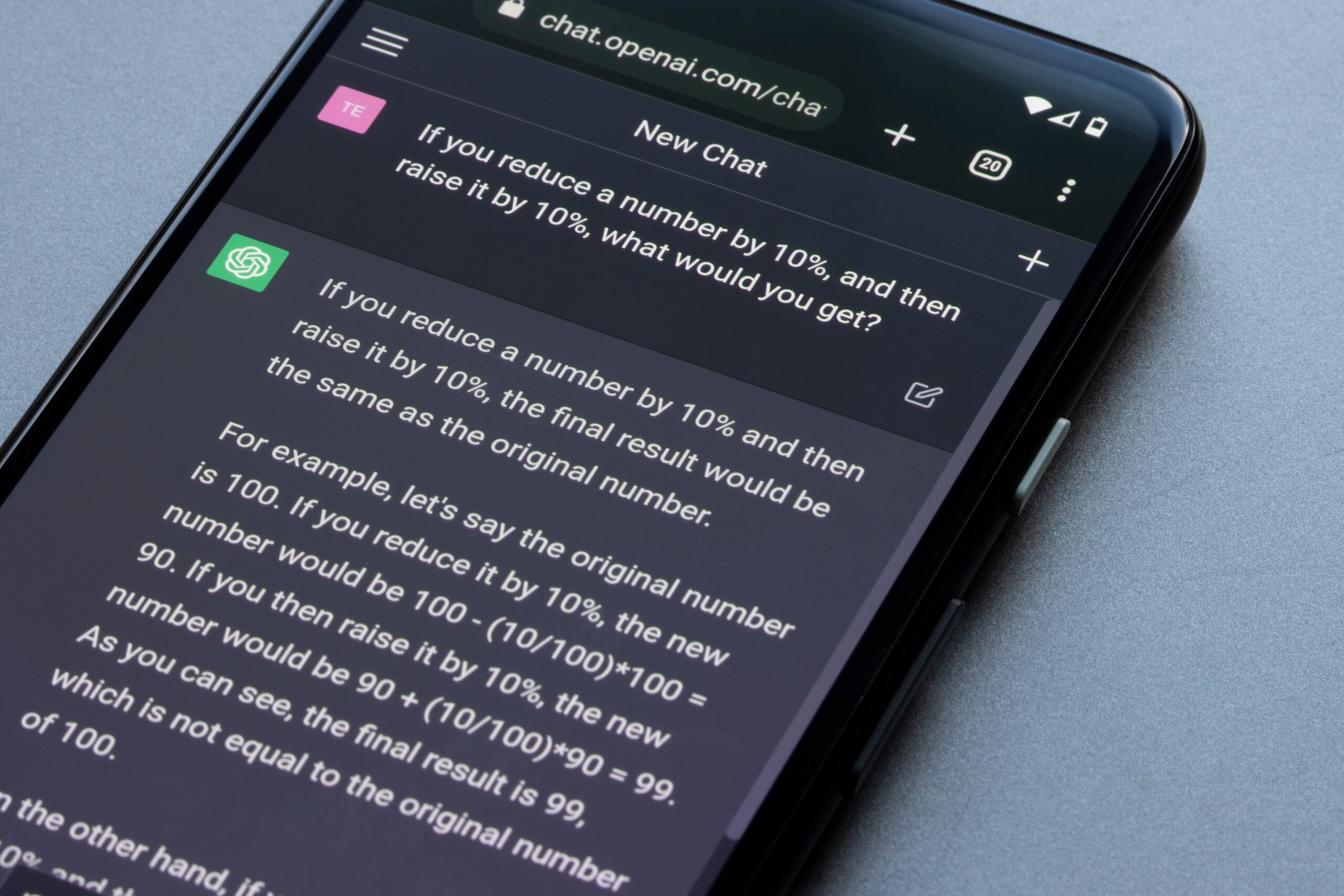
A customer chatting with a chatbot. (Source – Shutterstock)
Chatbots invade retail: The US$72 billion AI revolution led by ChatGPT
|
Getting your Trinity Audio player ready... |
- Juniper Research predicts a US$12 billion retail spend via AI-chatbots by 2023.
- High AI training costs historically made chatbots a low omnichannel strategy priority.
In the evolving digital landscape, AI-driven chatbots are transforming customer service in the retail sector. These advancements, powered by progress in open language models, are changing the way consumers interact with businesses.
A forecast by Juniper Research suggests a significant leap in global retail spending on chatbots – expected to reach US$12 billion in 2023 and rocket to US$72 billion by 2028. This growth, a whopping 470% increase in 5 years, is spurred primarily by the rise of cost-effective open language models, notably ChatGPT. Especially in North America and Europe, these models are paving the way for an overhaul in retail chatbot interactions.
Open language models are expansive neural networks trained on copious amounts of online data, honing their skills with limited human oversight. These models are incorporated into chatbots to automate various functions such as customer support, marketing, and transaction processing.
How ChatGPT is revolutionizing AI chatbots in retail
The report suggests that the progress of open language models will be a pivotal driver of retail spending growth among small and medium-scale retailers who were previously unable to invest in chatbot technology. As Frederick Savage, the research author, explained, “Chatbots have historically been a low priority for omnichannel strategies owing to the high cost of training AI-based algorithms. However, ChatGPT has significantly disrupted this trend; lowering the cost of implementation of chatbots for smaller retailers.”
Watch the video below on how ChatGPT can be used in the retail industry:
ChatGPT offers immense potential for retailers as a powerful tool for market research. By analyzing customer data, ChatGPT can provide insights into consumer behavior, including popular products, the most effective marketing channels, and the drivers of customer loyalty.
AI solutions like ChatGPT have the capability to gather and analyze consumer feedback, conducting surveys that allow retail businesses to delve deeper into customer likes and issues. This provides a more profound comprehension of their customer base, and executives can harness this knowledge to refine their merchandise and promotional plans.
Moreover, by providing highly customized product suggestions, retailers can elevate the customer experience and consequently increase sales. ChatGPT has the ability to scrutinize customer data and utilize this to propose products that match with the customer’s tastes, past purchases, and behaviors. Through AI, companies can further support customers in their search for products according to their individual requirements, such as fit, color, or fashion.
ChatGPT can be integrated into retail customer service channels to provide immediate, automated, 24/7 support. For instance, retailers can utilize ChatGPT to develop conversational chatbots that answer common customer queries and address concerns in real-time. ChatGPT can give customers real-time updates on their orders, including shipping details and estimated delivery dates. Additionally, thanks to ChatGPT’s language translation capabilities, retailers can offer customer service and support in multiple languages, allowing them to cater to a more diverse customer base.

ChatGPT answers a user queries. (Source – Shutterstock)
APAC dominates the global chatbot spending
Despite housing just 53% of the world’s population, the report projects that the Asia Pacific region will be responsible for 85% of global retail spending via chatbots. This can be attributed to the strong partnerships that messaging apps like WeChat, LINE, and Kakao have forged with many online retailers, creating significant trust in chatbots as a retail platform.
However, the study forecasts that the rise of open language models will fuel growth beyond Asia. By 2028, it is estimated that 66% of the spending will come from this region, as online retailers from regions like North America and Europe begin to incorporate chatbots into their retail strategies. To capitalize on this growth beyond Asia Pacific, the report advises vendors to focus on online retailers in these two regions.
How the next-gen AI is replacing traditional chatbots for better customer service
E-commerce retailers are keen on upgrading their chatbot features to fulfill customer needs, from order updates to personalized recommendations. However, many consumers have reported unsatisfactory experiences with retail chatbots, pointing towards the promising potential of integrating more advanced systems like ChatGPT.
As the era of AI-powered customer service arrives, with large corporations embracing ChatGPT or developing their own bots, smaller emerging businesses are expected to join the trend. These businesses are likely to seek economical solutions from chatbot vendors. AI-enhanced shopping experiences, which monitor consumer behavior and guide decisions throughout the purchase journey with increased personalization, can greatly benefit these businesses.
Traditional chatbots, however, cannot meet customer expectations and exhibit limited sales capability. A mere 17% of retail chatbot users have utilized a bot for product searches, and an even lower figure of 7% for product recommendations. ChatGPT-like solutions, with their advanced ability to handle intricate and sophisticated customer inquiries, can address the prevalent issues linked with retail chatbots. A significant 67% of ChatGPT users frequently or always feel that the bot understands them, a feeling echoed by only a quarter of traditional chatbot users.
Despite the favorable impressions ChatGPT has made on consumers and business leaders, its use in e-commerce is still limited. Retailers are optimistic about the potential benefits of ChatGPT for their businesses. Many have already utilized it for tasks like email marketing and content generation. Still, the lack of an available integration prevents them from leveraging this AI for everyday customer service chatbot needs.
READ MORE
- Safer Automation: How Sophic and Firmus Succeeded in Malaysia with MDEC’s Support
- Privilege granted, not gained: Intelligent authorization for enhanced infrastructure productivity
- Low-Code produces the Proof-of-Possibilities
- New Wearables Enable Staff to Work Faster and Safer
- Experts weigh in on Oracle’s departure from adland


